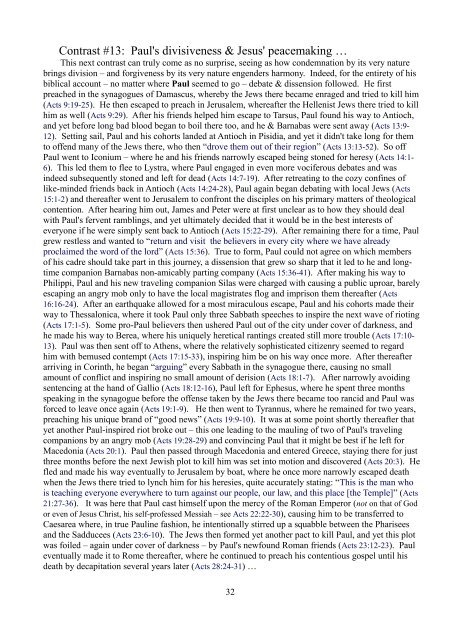The Cult of Paul
an exhaustive biblical examination of the starkly contrasting lives, values, & theologies of Jesus Christ and Paul -- Jesus' most zealous “apostle,” and the true father of the modern-day Christian church
an exhaustive biblical examination of the starkly contrasting lives, values, & theologies of Jesus Christ and Paul -- Jesus' most zealous “apostle,” and the true father of the modern-day Christian church
Create successful ePaper yourself
Turn your PDF publications into a flip-book with our unique Google optimized e-Paper software.
Contrast #13: <strong>Paul</strong>'s divisiveness & Jesus' peacemaking …<br />
This next contrast can truly come as no surprise, seeing as how condemnation by its very nature<br />
brings division – and forgiveness by its very nature engenders harmony. Indeed, for the entirety <strong>of</strong> his<br />
biblical account – no matter where <strong>Paul</strong> seemed to go – debate & dissension followed. He first<br />
preached in the synagogues <strong>of</strong> Damascus, whereby the Jews there became enraged and tried to kill him<br />
(Acts 9:19-25). He then escaped to preach in Jerusalem, whereafter the Hellenist Jews there tried to kill<br />
him as well (Acts 9:29). After his friends helped him escape to Tarsus, <strong>Paul</strong> found his way to Antioch,<br />
and yet before long bad blood began to boil there too, and he & Barnabas were sent away (Acts 13:9-<br />
12). Setting sail, <strong>Paul</strong> and his cohorts landed at Antioch in Pisidia, and yet it didn't take long for them<br />
to <strong>of</strong>fend many <strong>of</strong> the Jews there, who then “drove them out <strong>of</strong> their region” (Acts 13:13-52). So <strong>of</strong>f<br />
<strong>Paul</strong> went to Iconium – where he and his friends narrowly escaped being stoned for heresy (Acts 14:1-<br />
6). This led them to flee to Lystra, where <strong>Paul</strong> engaged in even more vociferous debates and was<br />
indeed subsequently stoned and left for dead (Acts 14:7-19). After retreating to the cozy confines <strong>of</strong><br />
like-minded friends back in Antioch (Acts 14:24-28), <strong>Paul</strong> again began debating with local Jews (Acts<br />
15:1-2) and thereafter went to Jerusalem to confront the disciples on his primary matters <strong>of</strong> theological<br />
contention. After hearing him out, James and Peter were at first unclear as to how they should deal<br />
with <strong>Paul</strong>'s fervent ramblings, and yet ultimately decided that it would be in the best interests <strong>of</strong><br />
everyone if he were simply sent back to Antioch (Acts 15:22-29). After remaining there for a time, <strong>Paul</strong><br />
grew restless and wanted to “return and visit the believers in every city where we have already<br />
proclaimed the word <strong>of</strong> the lord” (Acts 15:36). True to form, <strong>Paul</strong> could not agree on which members<br />
<strong>of</strong> his cadre should take part in this journey, a dissension that grew so sharp that it led to he and longtime<br />
companion Barnabas non-amicably parting company (Acts 15:36-41). After making his way to<br />
Philippi, <strong>Paul</strong> and his new traveling companion Silas were charged with causing a public uproar, barely<br />
escaping an angry mob only to have the local magistrates flog and imprison them thereafter (Acts<br />
16:16-24). After an earthquake allowed for a most miraculous escape, <strong>Paul</strong> and his cohorts made their<br />
way to <strong>The</strong>ssalonica, where it took <strong>Paul</strong> only three Sabbath speeches to inspire the next wave <strong>of</strong> rioting<br />
(Acts 17:1-5). Some pro-<strong>Paul</strong> believers then ushered <strong>Paul</strong> out <strong>of</strong> the city under cover <strong>of</strong> darkness, and<br />
he made his way to Berea, where his uniquely heretical rantings created still more trouble (Acts 17:10-<br />
13). <strong>Paul</strong> was then sent <strong>of</strong>f to Athens, where the relatively sophisticated citizenry seemed to regard<br />
him with bemused contempt (Acts 17:15-33), inspiring him be on his way once more. After thereafter<br />
arriving in Corinth, he began “arguing” every Sabbath in the synagogue there, causing no small<br />
amount <strong>of</strong> conflict and inspiring no small amount <strong>of</strong> derision (Acts 18:1-7). After narrowly avoiding<br />
sentencing at the hand <strong>of</strong> Gallio (Acts 18:12-16), <strong>Paul</strong> left for Ephesus, where he spent three months<br />
speaking in the synagogue before the <strong>of</strong>fense taken by the Jews there became too rancid and <strong>Paul</strong> was<br />
forced to leave once again (Acts 19:1-9). He then went to Tyrannus, where he remained for two years,<br />
preaching his unique brand <strong>of</strong> “good news” (Acts 19:9-10). It was at some point shortly thereafter that<br />
yet another <strong>Paul</strong>-inspired riot broke out – this one leading to the mauling <strong>of</strong> two <strong>of</strong> <strong>Paul</strong>'s traveling<br />
companions by an angry mob (Acts 19:28-29) and convincing <strong>Paul</strong> that it might be best if he left for<br />
Macedonia (Acts 20:1). <strong>Paul</strong> then passed through Macedonia and entered Greece, staying there for just<br />
three months before the next Jewish plot to kill him was set into motion and discovered (Acts 20:3). He<br />
fled and made his way eventually to Jerusalem by boat, where he once more narrowly escaped death<br />
when the Jews there tried to lynch him for his heresies, quite accurately stating: “This is the man who<br />
is teaching everyone everywhere to turn against our people, our law, and this place [the Temple]” (Acts<br />
21:27-36). It was here that <strong>Paul</strong> cast himself upon the mercy <strong>of</strong> the Roman Emperor (not on that <strong>of</strong> God<br />
or even <strong>of</strong> Jesus Christ, his self-pr<strong>of</strong>essed Messiah – see Acts 22:22-30), causing him to be transferred to<br />
Caesarea where, in true <strong>Paul</strong>ine fashion, he intentionally stirred up a squabble between the Pharisees<br />
and the Sadducees (Acts 23:6-10). <strong>The</strong> Jews then formed yet another pact to kill <strong>Paul</strong>, and yet this plot<br />
was foiled – again under cover <strong>of</strong> darkness – by <strong>Paul</strong>'s newfound Roman friends (Acts 23:12-23). <strong>Paul</strong><br />
eventually made it to Rome thereafter, where he continued to preach his contentious gospel until his<br />
death by decapitation several years later (Acts 28:24-31) …<br />
32

















